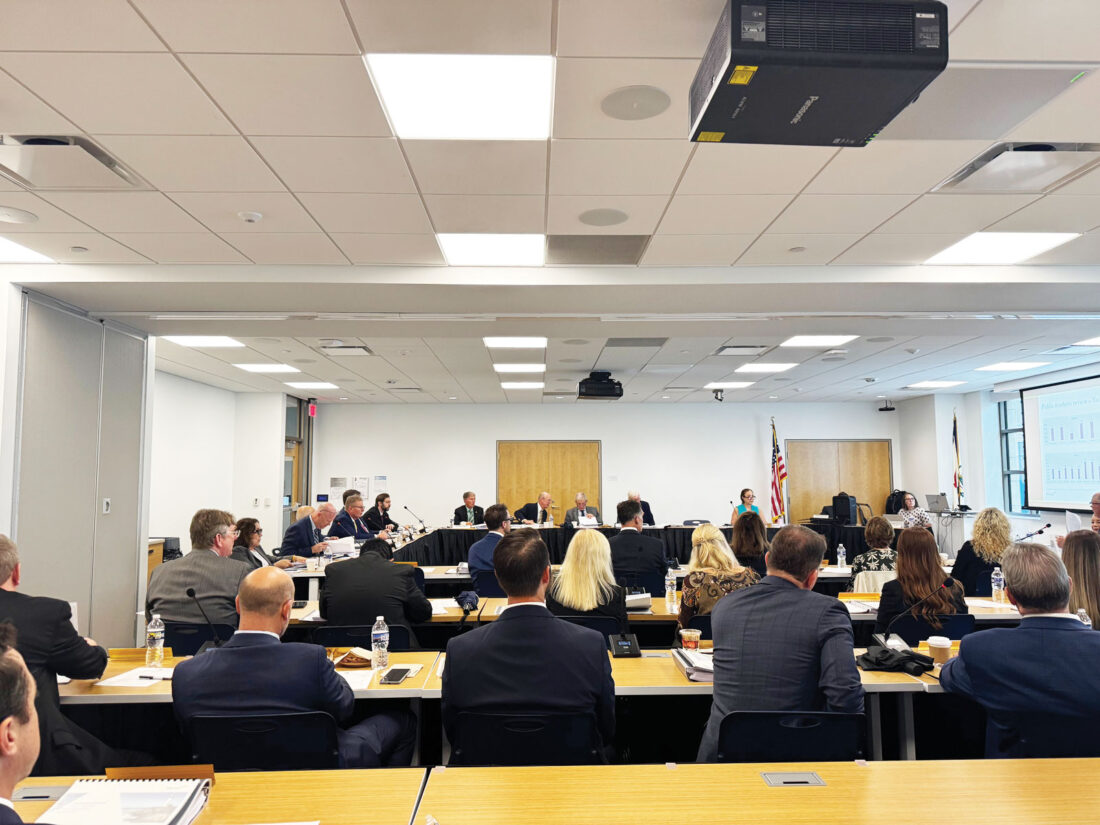Investment Management Board approves plan to divest West Virginia from Chinese investments
September 24, 2025

The West Virginia Investment Management Board met Wednesday morning to approval a final plan to divest from Chinese-connected companies. (Photo courtesy of the State Treasurer’s Office)
CHARLESTON — Five months after agreeing to divest West Virginia’s public long-term investments from Chinese companies, the Investment Management Board approved a divestment plan Wednesday.
During its regular quarterly meeting held Wednesday morning at the Kanawha County Public Library in downtown Charleston, the IMB approved a long-term plan to completely divest from Chinese-connected companies and investments by the beginning of calendar year 2026.The IMB voted in May to begin work on a Chinese divestment policy, following a similar policy adopted by the Board of Treasury Investments (BTI). The move was praised Wednesday by Gov. Patrick Morrisey, who made the motion in May, and State Treasurer Larry Pack, who chairs IMB and has pushed for Chinese divestment since February.
“The Chinese Communist Party is our biggest geopolitical foe and poses a national security risk to West Virginians and Americans,” Morrisey said in a statement. “Thank you to the Investment Management Board for putting a plan in motion to carry out my requested resolution to divest from the CCP.
By early 2026, West Virginia will no longer have investments in Chinese state-owned entities.”
“Just like President Donald Trump is working diligently to put American interests first, we must do our part to hold bad foreign actors accountable,” Pack said in a separate statement. “The board’s decision is a step in the right direction to ensure that we put our citizen’s interests first and do not put American dollars at risk. There is no reason for us to invest in a country that is working against our way of life and at the same time, divesting in China means investing more dollars in our great state.”Pack, who also chairs the BTI, first proposed a Prohibited Foreign Investment Policy, which was adopted by BTI during its quarterly meeting in March. The policies call for reviews of all state short-term and long-term investments, identify any investments in Chinese owned or controlled companies, and divest state tax dollars from those companies.
“Governor Patrick Morrisey followed our lead by proposing a similar policy for the IMB, ensuring our state’s long-term investments, including our state pensions, do not finance the People’s Republic of China,” Pack said. “By standing strong against the Chinese Communist government, we can deliver real, lasting benefits to American workers, citizens, and businesses in West Virginia and beyond.”
Pack banned the use of Chinese-connected artificial intelligence products and financial tools from the devices of employees of the State Treasurer’s Office earlier this year. Pack also joined 20 other state financial officials in a letter to the U.S. Securities and Exchange Commission asking for an investigation into whether Chinese companies should be delisted from the U.S. Stock Exchange.
During his first term, Trump issued an executive order prohibiting U.S. investors from making investments in companies with connections to the Chinese military, mandating divestment by November 2021. In July, Trump issued an executive order requiring a Chinese-based company to divest from a California-based video processing company, citing national security risks.
Despite a 2024 law requiring Chinese-based ByteDance, the owners of popular social media app TikTok, to divest or sell the app, Trump has repeatedly pushed back those deadlines. Earlier this month, the Trump administration announced a deal that would place U.S. investors in charge of TikTok. The deal has not been finalized.
The IMB was created by the Legislature in 1997 to provide fiscal administration, investment and administration for the pension funds, workers’ compensation and coal workers’ pneumoconiosis funds, and other state funds. IMB manages more than $29 billion in investment. The BTI was created by the Legislature in 2005 to manage the state’s short-term investments, managing more than $10 billion in investments.Steven Allen Adams can be reached at sadams@newsandsentinel.com.
Search
RECENT PRESS RELEASES
Related Post
